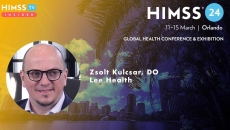clinical AI
HIMSS24
Emmanuel Bilbault, cofounder and CEO of POSOS, says the company's AI-driven international drug database's use of medication codes enables it to cross-reference EHR data and tailor prescriptions to meet a patient's specific needs.
HIMSS24
Zsolt Kulcsar, Lee Health's systems medical director of virtual health, discusses his team's upcoming AI chatbot, which will contact patients with unusual RPM biometric readings to determine if alerting a nurse is necessary.
HIMSS24
Tabia Health cofounder and CEO Steve Pickett and cofounder and CTO Ricardo Clemente talk about applying what they learned about analyzing data to predict behavior in the oil and gas industry to their present work in digital health.
HIMSS24
Dr. Jeffrey Chen, clinical advisor at No Barrier AI, believes the company's AI medical interpreter app could improve outcomes for low-English-proficiency patients, prevent clinician burnout and reduce operational costs.
HIMSS24
Eric Robertson, chief technology strategist and growth officer at Jeeva Care, talks about how the company's AI companion helps patients track health goals and stick to their care program after a hospital stay.
HIMSS24
Dr. Colin Banas, CMO at DrFirst, discusses the company's medication adherence product. It uses AI to send texts that educate patients about medications and provides coupons and co-pay-assistance program information, if cost is an issue.
HIMSS24
Alex Diaconu, CEO of AiGIA Health, shares the story of how his chronic illness inspired him to start the company to help patients improve their health by practicing preventative care.
Mayo Clinic vice chair of AI and innovation Dr. Alexander Ryu discusses building frameworks for AI fairly and equitably through collaboration - and how the organization decides to partner with companies with already established models.
In part two of a two-part series, Dr. Bruce Darrow, CMIO and interim CDIO at Mount Sinai Health System, discusses how the health system utilizes AI for predictive care, reading diagnostic images, and streamlining administrative operations.
In part one of a two-part series, Dr. Bruce Darrow, Mount Sinai Health System CMIO and interim CDIO, relays how patients may gain confidence in relying on AI instead of doctors as accuracy of pattern recognition and predictive models improve.









